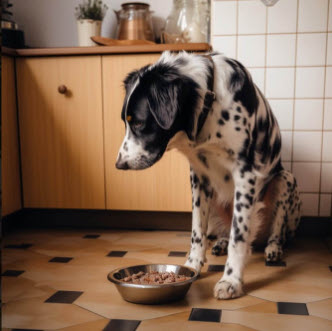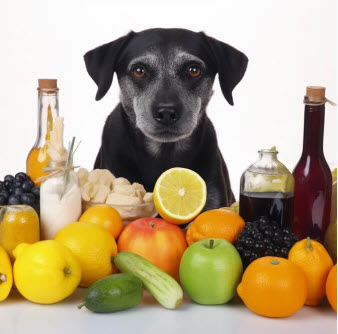Would you prefer to listen to a short podcast discussion about this article? Click on the audio below.
As pet owners, we want our furry friends to lead happy and healthy lives. However, sometimes we unintentionally feed our dogs food harmful to their health. Many human foods can be toxic to dogs, causing severe health problems or even death. This is a list of the top ten toxic foods to avoid feeding your pet at all costs. By being aware of these harmful foods, you can keep your dog safe and healthy and ensure they live a long, healthy, happy life.
Table of Contents
The Top Ten Toxic Foods for Dogs
As pet owners, it is easy to accidentally feed them something that can cause severe harm or even death. So here are the top ten toxic foods for dogs that you should avoid giving them at all costs.
Chocolate
We all love chocolate, but it’s essential to understand that it’s toxic to dogs. Chocolate contains caffeine and theobromine, which dogs can’t metabolize as effectively as humans. As a result, it stays in their system longer and can quickly become toxic.
Types of Chocolate
All types of chocolate can be toxic foods to dogs, but dark chocolate and baker’s chocolate are the most dangerous. Milk chocolate and white chocolate have less theobromine, but they can still cause harm.
Symptoms of Chocolate Poisoning
Symptoms of poisoning from chocolate can include vomiting, diarrhoea, hyperactivity, increased thirst, tremors, seizures, and even death.
Treatment for Chocolate Poisoning
If you believe your dog has ingested chocolate, it’s essential to contact your veterinarian immediately. They may induce vomiting or administer activated charcoal to prevent the absorption of theobromine. In severe cases, hospitalization and intravenous fluids may be necessary.
Grapes and Raisins
Grapes and, of course, raisins can cause kidney damage in dogs, even in small amounts. Unfortunately, the exact cause of toxicity is unknown, and not all dogs are affected.
Toxicity of Grapes and Raisins
The toxic dose of grapes and raisins is unknown and can vary depending on the dog’s size and overall health.
Symptoms of Grape and Raisin Poisoning
Grapes and of course, raisin poisoning symptoms can include vomiting, diarrhoea, decreased appetite, lethargy, and kidney failure. Signs can occur within hours or days of ingestion.
Treatment for Grape and Raisin Poisoning
If you suspect your dog has ingested either of these items, contact your veterinarian immediately. Treatment may involve inducing vomiting, fluids, and medications to support kidney function.
Onions, Garlic
Onions and garlic contain some compounds that can cause damage to dogs’ red blood cells, leading to anaemia. In addition, the toxicity of these foods can be cumulative, so even small amounts can cause harm over time.
Toxicity of Onions and Garlic
Even in cooked or powdered form, onions and garlic can cause toxicity. However, the toxic dose can vary depending on the dog’s size and overall health.
Symptoms of Onion and Garlic Poisoning
Onion and garlic poisoning symptoms can include vomiting, diarrhoea, weakness, lethargy, and pale gums. Signs can occur within days or weeks of ingestion.
Treatment for Onion and Garlic Poisoning
As with all other poisoning mentioned in this article, contact your veterinarian immediately. Treatment may involve inducing vomiting or medications to support the dog’s red blood cells.

Xylitol
Xylitol is a well-known sugar substitute that can be found in sugar-free gum, candy, and baked goods. It can cause a rapid insulin release in dogs, leading to hypoglycemia (low blood sugar), seizures, and liver failure.
Toxicity of Xylitol
Xylitol is toxic to dogs in even small amounts, with just a piece of gum containing enough to cause harm.
Symptoms of Xylitol Poisoning
Symptoms of xylitol poisoning can include vomiting, loss of coordination, seizures, and lethargy. Signs can occur within 30 minutes to 12 hours after ingestion.
Treatment for Xylitol Poisoning
Again, contact your veterinarian immediately. Treatment may involve inducing vomiting or administering activated charcoal and hospitalization for supportive care.
Avoiding these toxic foods is crucial to keeping your dog healthy and happy. If you suspect your dog has ingested something harmful, get to the vet immediately. Remember always to read food labels and keep harmful items out of reach of your pets.
Avocado
Do you love guacamole? Well, your dog shouldn’t share your enthusiasm for avocados. Avocado contains a substance called persin that is harmful to dogs. While persin is not toxic to humans, it can cause vomiting and diarrhoea in dogs.
Toxicity of Avocado
Persin is found in the avocado plant’s leaves, fruit, and seed. While the fruit pulp is not as toxic as the other parts of the plant, dogs should avoid eating avocado altogether.
Symptoms of Avocado Poisoning
Symptoms of avocado poisoning in dogs include vomiting, diarrhoea, and difficulty breathing. In severe cases, dogs may suffer from fluid accumulation in the chest, and their airways may become blocked.
Treatment for Avocado Poisoning
Treatment for avocado poisoning in dogs includes inducing vomiting and providing supportive care to help your dog recover. If your dog has ingested avocado and is showing poisoning symptoms, seek veterinary attention immediately.
Alcohol
Dogs should not be given alcohol, even in small amounts. Alcohol can cause severe poisoning in dogs and can lead to death in extreme cases.
Toxicity of Alcohol
Alcohol is rapidly absorbed into a dog’s bloodstream, leading to increased blood sugar levels and a drop in body temperature. This can cause central nervous system depression, leading to respiratory failure and even death.
Symptoms of Alcohol Poisoning
Symptoms include vomiting, diarrhoea, difficulty breathing, and changes in behaviour, such as lethargy and confusion. In severe cases, dogs may suffer from seizures and coma.
Treatment for Alcohol Poisoning
If your dog has ingested alcohol, seek veterinary attention immediately. Treatment for alcohol poisoning in dogs includes supportive care, medications, intravenous fluids and medications to maintain blood sugar levels and prevent seizures.
Macadamia Nuts
Macadamia nuts, while delicious for humans, can be toxic to dogs. They contain a toxin that can cause severe poisoning, even in small amounts.
Toxicity of Macadamia Nuts
The exact toxin in macadamia nuts that causes dog poisoning is still unknown. However, it is known that even small amounts can cause poisoning symptoms.
Symptoms of Macadamia Nut Poisoning
Symptoms of poisoning by macadamia nuts include weakness, ataxia (lack of coordination), vomiting, and diarrhoea. In severe cases, dogs may suffer from muscle tremors and hypothermia.
Treatment for Macadamia Nut Poisoning
If your dog has ingested macadamia nuts and is showing poisoning symptoms, seek veterinary attention immediately. Treatment for macadamia nut poisoning in dogs includes supportive care to help your dog recover.
Raw or Undercooked Meat and Eggs
If you’re cooking up a steak for dinner, don’t give your dog a raw or undercooked piece. Raw or undercooked meat and eggs can be contaminated with bacteria (i.e., Salmonella and E. coli), which can and will cause severe illness in dogs.
Toxicity of Raw/Undercooked Meat or Eggs
These can contain harmful bacteria that cause food poisoning in dogs. These bacteria can cause vomiting, diarrhoea, and in severe cases, even death.
Symptoms of Raw or Undercooked Meat and Egg Poisoning
Symptoms of food poisoning can include vomiting, diarrhoea, and lethargy. In severe cases, dogs may suffer from dehydration and organ failure.
Treatment for Raw or Undercooked Meat and Egg Poisoning
If your dog has ingested raw or undercooked meat or eggs and is showing symptoms of food poisoning, seek veterinary attention immediately. Treatment for food poisoning in dogs includes supportive care and antibiotics to help your dog recover. Knowing which human foods are harmful to your dog is essential as a pet owner. By avoiding the top ten toxic foods mentioned in this article, you can keep your furry friend safe and healthy. If your dog accidentally ingests any of these foods, immediately seek veterinary assistance. Remember, prevention is both better and cheaper than cure, so keep these toxic foods away from your dog’s reach and opt for dog-safe treats and foods instead.

FAQ
What should I do if my pet eats toxic food?
Contact your vet immediately if you think or believe your dog has eaten toxic food. The earlier you seek veterinary assistance, the higher the chances of saving your pet’s life.
Can a small amount of toxic food harm my dog?
Yes, even a tiny amount of toxic food can harm your dog. Some toxic foods can cause severe health problems, while others can be fatal in small amounts. So, always keep unhealthy foods away from your dog’s reach.
Are all dogs equally sensitive to toxic foods?
Some dogs may be more sensitive to certain toxic foods than others. Factors such as breed, age, weight, and health status can determine how a dog reacts to a particular toxic food.
Can I give my dog any human foods?
Yes, some human foods, such as lean meats, vegetables, and fruits, can be safe and healthy for dogs. However, always check with your veterinarian first to ensure the food is safe for your dog to eat and in what quantities.
If you require any assistance with this article, please do not hesitate to Contact Us
Help support the PDSA with a monthly donation




















